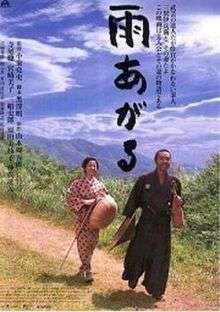After the Rain (film)
| After the Rain | |
|---|---|
 Japanese film poster | |
| Directed by | Takashi Koizumi |
| Produced by | Masato Hara[1] |
| Screenplay by | Akira Kurosawa[1] |
| Story by | Shugoro Yamamoto |
| Starring |
|
| Music by | Masaru Sato[1] |
| Cinematography | Shoji Ueda[1] |
| Edited by | Hideto Aga[1] |
Production companies |
|
| Distributed by | Toho[1] |
Release date |
|
Running time | 91 minutes[1] |
| Country |
|
After the Rain (雨あがる Ame agaru) is a 1999 Japanese and French film. The story is based on the last script written by Akira Kurosawa and is directed by his former assistant director of 28 years, Takashi Koizumi. It was awarded a Japanese Academy Award in 1999. It was chosen as Best Film at the Japan Academy Prize ceremony.[2]
Synopsis
A group of travelers are stranded in a small country inn when the local river floods. As the bad weather continues, tensions rise amongst the travelers trapped at the inn. A traveling rōnin (masterless samurai), Ihei Misawa takes it upon himself to cheer everyone up by arranging a splendid feast. Unfortunately he has no money and in order to pay for the feast he visits the local dojos and challenges the masters there for payment, termed in the film as prize fighting. Later, after breaking up a duel between two young retainers of the local clan he receives an offer of employment as a sword master from the local lord, Shigeaki. He has a tense interaction with the lord and his retainers, revealing his prowess at their expense. The film also shows the tender relationship he has with his wife, Tayo, and provides insights into the way of life of a rōnin's wife.
Cast
- Akira Terao: Ihei Misawa
- Yoshiko Miyazaki: Tayo Misawa
- Shiro Mifune: Lord Nagai Izuminokami Shigeaki
- Fumi Dan: Okugata
- Hisashi Igawa: Kihei Ishiyama
- Hidetaka Yoshioka: Chamberlain Gonnojo Sakakibara
- Takayuki Katô: Hayato Naito
- Mieko Harada: Okin
- Tappie Shimokawa
- Tatsuo Matsumura: Sekkyo-Bushi Jii, the Old Preacher
- Tatsuya Nakadai: Tsuji Gettan
Release
After the Rain premiered at the Venice Film Festival on October 25, 1999.[1] It was released in Japan on January 22, 2000 where it was distributed by Toho.[1] It was released in France on May 3, 2000 where it was distributed by Opening Distribution.[3]
Awards
- 1999 - NOMINATED AFI Fest: Grand Jury Prize Award (Takashi Koizumi)
- 1999 - WON São Paulo International Film Festival: Mostra Special Award (Takashi Koizumi)
- 1999 - WON Venice Film Festival: CinemAwenire Award (Takashi Koizumi)
- 2000 - WON Nikkan Sports Film Awards for Best Actor (Akira Terao)
- 2001 - WON Awards of the Japanese Academy for Best Actor (Akira Terao), Best Art Direction, Best Cinematography, Best Film, Best Lighting, Best Music Score, Best Screenplay, Best Supporting Actress (Mieko Harada)
- 2001 - NOMINATED Awards of the Japanese Academy for Best Actress (Yoshiko Miyazaki), Best Director, Best Editing, Best Sound, Best Supporting Actor (Shiro Mifune)
- 2001 - WON Blue Ribbon Awards for Best Supporting Actress (Yoshiko Miyazaki)
- 2001 - WON Mainichi Film Awards for Best Cinematography
- 2001 - WON Portland International Film Festival: Audience Award (Takashi Koizumi)
Notes
- 1 2 3 4 5 6 7 8 9 10 11 Galbraith IV 2008, p. 413.
- ↑ "Awards for Ame agaru (1999)" (in Japanese). Internet Movie Database. Archived from the original on 12 April 2009. Retrieved 2009-05-05.
- ↑ "Ame agaru (1999)" (in French). Bifi.fr. Archived from the original on December 10, 2006. Retrieved October 23, 2015.
Bibliography
- Galbraith IV, Stuart (2008). The Toho Studios Story: A History and Complete Filmography. Scarecrow Press. ISBN 1461673747.
External links
- Ame agaru (1999) on IMDb
- Ame Agaru at AllMovie
- 雨あがる (in Japanese). Japanese Movie Database. Retrieved 2009-05-16.
- "AME AGARU". Complete Index to World Film. Retrieved 2009-05-16.
- 雨あがる (in Japanese). www.walkerplus.com. Retrieved 2009-05-16.
- 雨あがる(1999) (in Japanese). allcinema.net. Retrieved 2009-05-08.
- 雨あがる (in Japanese). Variety Japan. Retrieved 2009-05-16.